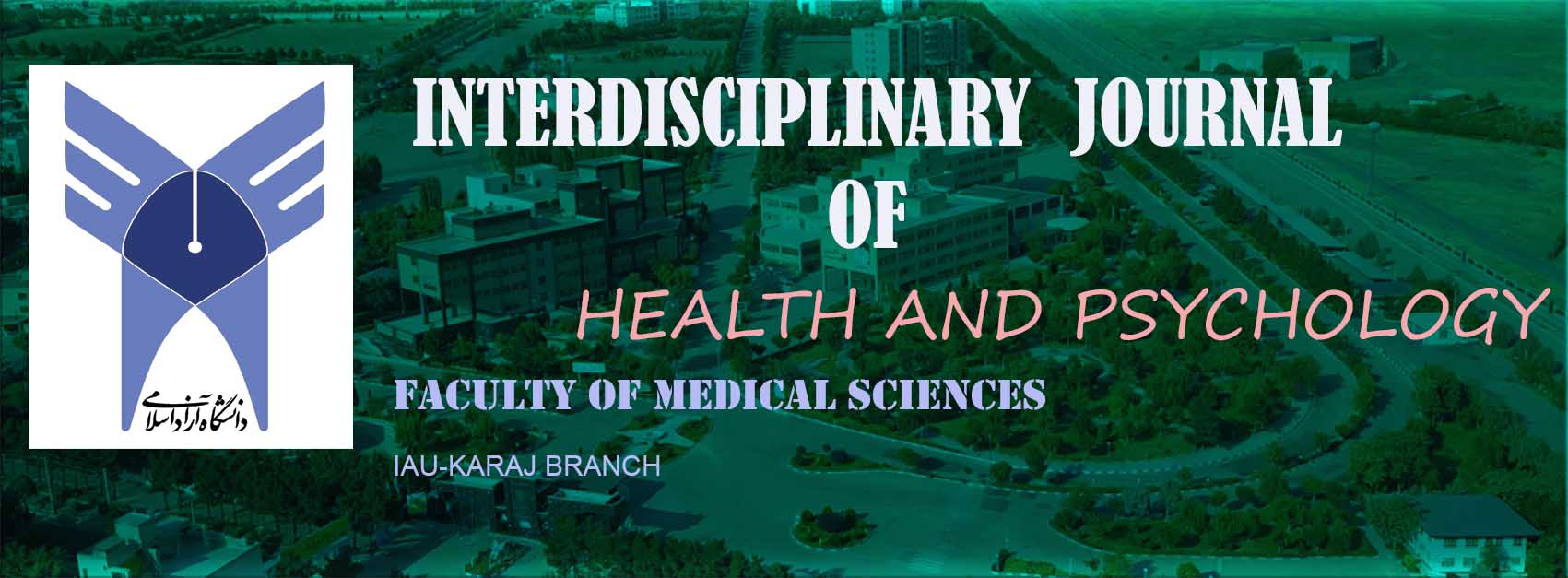The comparison of stress coping styles in people with childhood trauma and without trauma
Subject Areas : Health Sciences and Psychology
Zahra Keshavarz Tahsili
1
![]() ,
Ahmad Karbalaei Mohammad Meigouni
2
*
,
Ahmad Karbalaei Mohammad Meigouni
2
*
![]() ,
mohammadali kalhor
3
,
mohammadali kalhor
3
![]()
1 -
2 - استادیار دانشگاه آزاد اسلامی واحد کرج
3 - Department of Psychology, Karaj Branch, Islamic Azad University, Karaj, Iran.
Keywords: Childhood Trauma, Stress Coping Styles , without trauma.,
Abstract :
The purpose of this research was to compare stress coping styles in people with and without childhood trauma. The present research is based on the basic purpose and on the way of collecting analytical-descriptive data and the research design is of a causal-comparative post-event type. The statistical population of the research includes all students of the Islamic Azad University, Karaj branch, who were studying in the second semester of the academic year 1400-1401, using available sampling of 150 people (75 people with childhood trauma and 75 people without childhood trauma) were chosen. The tools of this research includes Bernstein et al.’s childhood trauma questionnaires and Lazarus’ and Folkman’s stress coping styles. Data analysis was done using multivariate analysis of variance (MANOVA) . The results show that people with childhood trauma use coping strategies of seeking social support, positive reappraisal, and thoughtful problem-solving less and more emotion-oriented avoidance and avoidance strategies compared to people without trauma.
بهمنی نیا، محمد. (1398). مقایسه توانمندی ایگو، روابط موضوعی و مکانیسمهای دفاعی افراد افسرده با افراد عادی. پایان نامه کارشناسی ارشد، دانشگاه آزاد اسلامی واحد مرودشت.
خباز قانع، عاطفه سادات. (1398). بررسی رابطه بین توانمندی ایگو با هیجان ابرازشده و سبکهای مقابلهای در معتادان مراجعهکننده بهکلینیکهای ترک اعتیاد. پایان نامه کارشناسی ارشد، دانشگاه خیام.
دریکوند، فاطمه؛ گلشنی، اکرم و گلشنی، فاطمه. (1400). بررسی مهارتهای مقابله با فشارهای روانی و مشکلات بر اساس نظریه روانشناختی فولکمن و لازاروس در مثنوی معنوی با تکیه بر حکایت شیر و نخجیران». مطالعات آموزشی و آموزشگاهی، دوره 10، شماره 1: صفحه 380-355.
غلامی، امین؛ فرخی، نورعلی و برجعلی، احمد. (1398). مدل یابی معادلات ساختاری راهبردهای مقابلهای دانشجویان بر اساس سبکهای دلبستگی باواسطه گری سبکهای فرزند پروری، آسیبهای دوران کودکی و طرحوارههای ناسازگار اولیه. فصلنامه مطالعات روانشناسی بالینی، دانشگاه علامه طباطبائی، سال 9، شماره 35: صفحه 69-41.
کارگری، محمد. (1399). پیشبینی طلاق عاطفی بر اساس سبکهای دلبستگی و سبکهای مقابله با استرس در معلمان مقطع ابتدایی شهر گرگان. پایان نامه کارشناسی ارشد رشته روانشناسی عمومی، دانشگاه پیام نور گرگان.
لرزنگنه، سارا و عیسی زادگان، علی. (1400). تبیین علائم خودشیفتگی بر اساس ابعاد ترومای کودکی و تحریف شناختی. مقاله پژوهشی، مجله مطالعات روانشناختی، دوره 17، شماره 3: صفحه 72-53.
Goghari, V. M., Shakeel, M. K., Swan, J. L., Kim, H. S., Sharif-Razi, M., & Hodgins, D. C. (2020). A Family Study of Trauma and Coping Strategies in Gambling Disorder. Journal of gambling studies, 36(3), 767–782. https://doi.org/10.1007/s10899-020-09963-0
Lee, S., Kim, H., & Kong, S. (2022). Associations between childhood psychological trauma, posttraumatic stress symptoms, and mental health in female college students: Mediation of coping styles. Perspectives in psychiatric care, 58(4), 1763–1775. https://doi.org/10.1111/ppc.12986
Liu, J., Yang, Y., Chen, J., Zhang, Y., Zeng, Y., & Li, J. (2022). Stress and coping styles among nursing students during the initial period of the clinical practicum: A cross-section study. International journal of nursing sciences, 9(2), 222–229. https://doi.org/10.1016/j.ijnss.2022.02.004
Tu, H., Gong, G., Zhang, S., Fu, Y., Wang, T., Chu, Q., Hu, S., Wang, K., Zhu, C., & Fan, Y. (2022). The association between illness perception and quality of life among Chinese adults with epilepsy: The mediating role of coping style. Epilepsy & behavior : E&B, 130, 108677. https://doi.org/10.1016/j.yebeh.2022.108677
Wang, L., Zhang, Y., Zhang, X., Fan, X., Qiong, L., & Hu, C. (2021). The Potential Impact of Childhood Traumatic Experiences on Coping Styles and Emotion Regulation of Nurse Practitioners During the COVID-19 Outbreak. Frontiers in psychology, 12, 718780. https://doi.org/10.3389/fpsyg. 2021.718780

